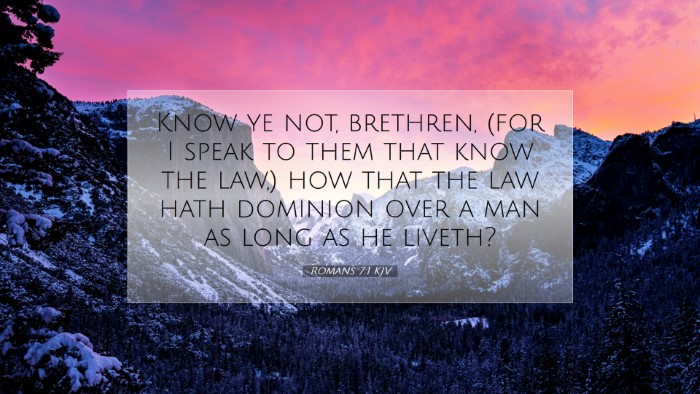Old Testament
Genesis Exodus Leviticus Numbers Deuteronomy Joshua Judges Ruth 1 Samuel 2 Samuel 1 Kings 2 Kings 1 Chronicles 2 Chronicles Ezra Nehemiah Esther Job Psalms Proverbs Ecclesiastes Song of Solomon Isaiah Jeremiah Lamentations Ezekiel Daniel Hosea Joel Amos Obadiah Jonah Micah Nahum Habakkuk Zephaniah Haggai Zechariah MalachiRomans 7:1
Romans 7:1 KJV
Know ye not, brethren, (for I speak to them that know the law,) how that the law hath dominion over a man as long as he liveth?
Romans 7:1 Bible Commentary
Commentary on Romans 7:1
The verse Romans 7:1 states:
“Do you not know, brethren (for I speak to those who know the law), that the law has dominion over a man as long as he lives?”
This verse serves as a pivotal point in Apostle Paul's discourse on the relationship between believers and the Law, introducing themes of life, death, and spiritual liberation. This commentary seeks to bring together insights from notable public domain commentators such as Matthew Henry, Albert Barnes, and Adam Clarke.
Contextual Understanding
In the Book of Romans, Paul addresses the complexities of sin, grace, and law. Romans 7 marks a transition where he elaborates on the believer's relationship with the Law. Paul aims to establish that while the law commands authority, its power is annulled in the life of a believer through Christ's redemptive work.
Reflection on the Law
- Matthew Henry notes that Paul is directly engaging the moral implications of the Law for believers. He emphasizes that the law has authority only as long as a man lives, indicating that one must pass from the old state of condemnation into life, thus being liberated from the Law’s dominion.
- Albert Barnes offers a practical interpretation of the phrase “know the law.” He explains that Paul speaks to those familiar with the Law to underline its principles. Barnes highlights that the law binds persons with conditions and periods of life, showcasing how the believer must comprehend this dynamic in terms of freedom in Christ.
- Adam Clarke provides a historical context to the verse, explaining that the Jews were intimately tied to the Law of Moses. He points out that recognizing the Law's dominion is profound for the Jewish audience, as it sets a framework for understanding spiritual liberation through Jesus Christ's sacrifice.
Spiritual Implications
In light of this verse, the spiritual implications for believers are significant. The theme of death and resurrection is crucial; through Christ's resurrection, believers are ushered into a new existence in which they are no longer bound by the Law’s requirements. This remains a key aspect of Pauline theology.
The Law and Its Authority
- According to Matthew Henry, the law is right and good, but it cannot justify. Therefore, understanding its limited dominion over a believer is essential for grasping the message of grace that Paul proclaims.
- Albert Barnes argues that the acknowledgment of the law's authority establishes a foundation for the transition into grace. The juxtaposition of living under the law versus living by faith is vividly outlined in subsequent verses.
- Clarke emphasizes that for the believer to truly appreciate their freedom, they must first recognize the weight of the Law. It helps them understand the depth of mercy received through Christ’s death and resurrection.
Practical Applications
Pastoral application of this verse can encompass several key takeaways:
- Understanding Freedom: Believers are encouraged to celebrate their freedom from the Law's condemnation. This is tied to living out one's faith in a manner that reflects true understanding of grace.
- Encouragement in Struggles: As Paul later discusses the internal struggle with sin, this verse lays the groundwork for acknowledging that the law, while good, cannot empower us in the fight against sin. The spiritual life is empowered by the Spirit.
- Teaching the Law’s Role: Pastors and teachers can utilize this verse to explain the purpose of the Law, which serves to reveal guilt and point towards the necessity of grace rather than merely condemning behavior.
Conclusion
Romans 7:1 carves out a significant theological space as it examines the lawful authority in relation to human beings’ spiritual journey. The insights from Henry, Barnes, and Clarke collectively underscore the importance of freedom from the Law’s dominion through Christ. For pastors, theologians, and scholars, it remains a vital verse to explore the complexities of faith, grace, and the continuing role of Scripture in the believer's life.


